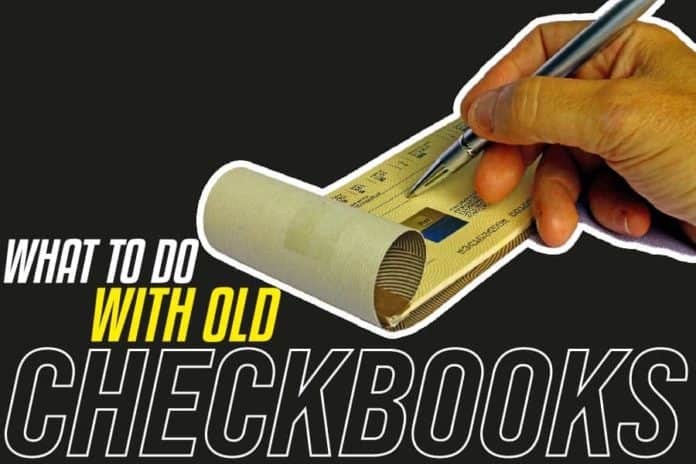Old checkbooks can be a source of information and even nostalgia for some people. But no one wants to go through the hassle of sorting them out, or worst-case scenario, risk identity theft when disposing of the old checkbooks improperly.
There are many checkbook alternatives, such as cash and credit cards, but if you’ve ever tried to get rid of a checkbook, you’re well aware that it’s not as simple as throwing it away.
In this article, we’ve compiled a list of helpful tips on how to get rid of checkbooks safely. This can be especially useful for businesses that still use them frequently.
What To Do With Old Checkbooks
When you finish using a checkbook, it’s essential to make sure that your information is protected by safely getting rid of them.
By shredding and burning the old checkbooks, you can ensure that no one will be able to gain access to your personal and financial information. Therefore you can avoid identity theft and fraudsters.
How To Destroy Old Checkbooks You Don’t Need
A checkbook is an essential part of running a business. If you’ve never written a check in your life (like many millennials), chances are you’ve participated in the process of writing one.
If you have a job or run your own business, your employer or client will likely ask for a check to pay you or deposit it into your account.
Checkbooks are the oldest and most common form of paying for things, but they’re also one of the most dangerous.
There is no way to retrieve what has already been written in them, and they are rife with privacy concerns.
As technology gets more advanced, it becomes easier to pay for items with a card than a checkbook.
While it might seem like a no-brainer, you would be amazed at how many people don’t do this.
Nobody wants to get ripped off and have their identity stolen, but that’s what can happen if you fail to destroy an old checkbook.
Checkbooks can be a valuable resource for tracking your spending over time. But if your account is closed or the checks have been lost, then you’re stuck with an outdated piece of paper that you don’t need anymore.
If you have old checkbooks lying around, there are plenty of ways to get rid of them safely!
1. Burning
Burning your old checkbooks is a great way to get rid of them safely. Why? Because you will preserve your privacy thoroughly since paper burns for a long time, and no evidence will be left behind.
Burning may be the most effective way to get rid of all those pesky checkbooks, in which case you can light them on fire and throw them into a bonfire or a trash can.
You can also burn them in the backyard or other remote areas. Burning them is a good idea if you have confidential information on the checkbook that you don’t want others to see.
Burning these items will ensure that they do not fall into the wrong hands. If you choose to do this, be sure to completely tear up any checks and receipts attached to the book first.
2. Shredding
Shredding is the easiest way to protect your information, but it can be tricky. If you use a shredder at home, you likely have a few notes that didn’t make it into the bin and are still sitting in your wastebasket.
That’s because many people fold up their receipts before tossing them in the trash, which makes them difficult to shred.
To keep your personal information away from identity thieves, you need to shred the checkbooks before throwing them away.
To avoid this problem, get yourself an industrial shredder. The extra-large blades will handle any paper size, and the build should withstand constant use.
You can use your office shredder to shred the old checkbooks. This process is straightforward and relatively simple, but it does leave behind some traces of your identity.
One could easily piece together the pieces of paper to find a bank account or other helpful information.
Well, it might take some time, so it’s important to go an extra mile and place different shredded pieces in separate bins or throw them out on other days. That way, it becomes difficult for anyone to piece together the information.
In other cases, you can take your old checkbooks to the bank so that they can shred them for you in a secure location.
3. Soaking In Liquid
If you have a checkbook that you don’t want to use anymore, the best way to get rid of it is to ensure that nobody can ever use it again.
The best way to get rid of it is by soaking it in a liquid that will break down the paper. You can do this by soaking it in a liquid that will disintegrate the paper.
Common household liquids like vinegar, lemon juice, ammonia, and bleach are examples of liquids that will help remove information from a checkbook.
To do this, place the checkbook and paper into a large bowl and then fill it with water. This will soften the paper and make it easier to tear or rip out and remove the ink from the paper. In the end, you’ll remain with paper pulp, which is pretty much useless to anyone willing to steal information.
4. Washing
Run the checkbook through the laundry and get the ink entirely off. This method is simple and should take no more than 10 minutes of your time; however, it’s pretty risky and can damage other clothes.
To avoid this, place the checkbooks in a sturdy paper bag and tightly close the contents. Run through the washing machine several times.
This is because the old checks can wash off easily, leaving behind only the checkbook stubs with all of your financial details still visible.
Running through several cycles ensures that all the ink entirely runs off the paper, leaving no traces behind.
5. Flush Down The Toilet
Checkbooks can contain crucial private information such as your checking account routing number and name.
Once you decide to get rid of them, you should first cut the checkbook into small pieces and then flush them down the toilet or throw them in a trash bin.
6. Composting
Composting is a great way to get rid of your checkbooks; you will be surprised by how easy it is. Pile up all of your old checkbooks and place them in a spot where they will get the most sun.
You might want to spread a nice little layer of dirt under them, so they have something absorb the wetness.
After you put them out in the sun for about six weeks, they should be completely broken down and ready to be used in your garden.
Why Get Rid Of Old Checkbooks?
The checkbook is the most common small business financing tool. It is an easy way to pay bills and save money.
Yet, there are some concerns about using it. Many people wonder if it is safe to use a checkbook to handle finances.
It’s not a bad idea to stop using your checkbooks and move to online payments. This will cut down on fraud and make it easier to manage your money effectively.
There are three main reasons why you should get rid of your old checkbooks:
- Checkbooks can be dangerous; they include sensitive personal information, such as social security numbers, account information, and signatures. The account information can still be accessed and used by anyone who comes across it.
- They also contain checks that have not yet cleared the bank and can provide checking account information to anyone who finds them.
- They can also be cumbersome and difficult to carry around. And they are expensive to store and maintain, especially if you decide to digitize your checks.
After How Long Should You Get Rid Of Checkbooks?
It would be best to get rid of your checkbook in 7 years or when you finish filling tax returns, whichever comes first. This is to keep you safe from any discrepancies that may arise and need proof.
After seven years, you can dispose of the old checkbooks using the above-listed methods.
Conclusion
As you can see, getting rid of old checkbooks is not as simple as throwing them in the trash or recycling bin. If you want to dispose of your old checkbooks safely and effectively, it’s essential to know how to do so safely.
The most effective method is to burn or shred them and carefully dispose of them in the garbage afterward. Fortunately, with these tips, you can erase your personal information and protect yourself in the process. We hope these ideas have been helpful!












